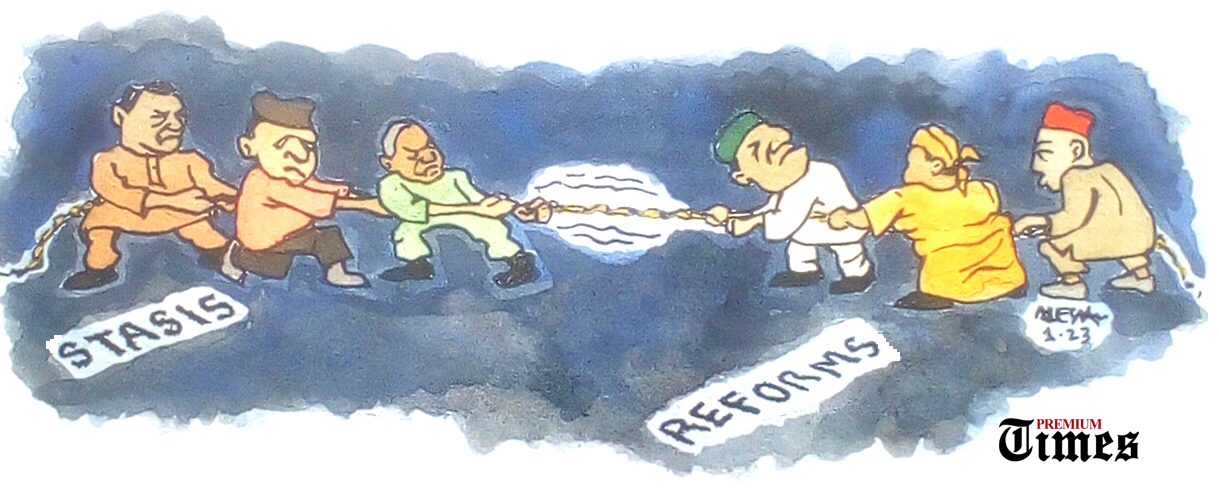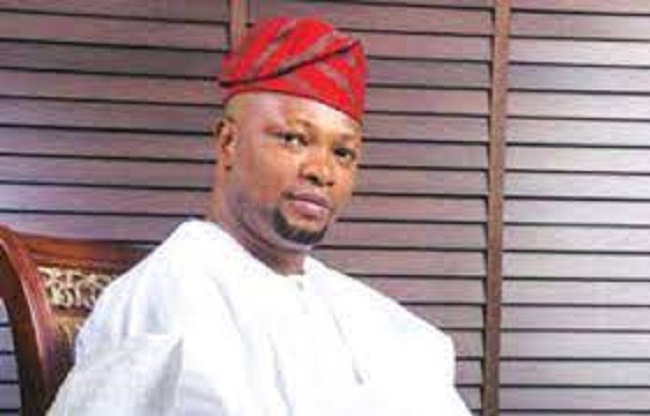EDITORIAL - Solving the N/Assembly Constitutional Amendment Quagmire
The process of amending the 1999 Constitution by the Ninth National Assembly fell through as 25 state legislatures have yet to vote on the amendments, more than six months after they were been transmitted as stipulated in the Constitution. The leadership of the legislature has now pleaded with one of the governors to pressure his colleagues to pressure their state assemblies to fulfill their constitutional responsibilities on the matter in the interest of the Nigeria. Just five months before the end of the current legislative exemption, accomplishing this task seems to have become a race against time.
A total of 44 amending bills, in accordance with the Constitutional Review, were sent to the legislatures of 36 states on May 29, 2022. But only 11 states considered them. These are Abia, Akwa Ibom, Anambra, Delta, Edo, Kaduna, Katsina, Kogi, Lagos, Ogun and Osun States. Two-thirds, or 24 of the 36 states, must statutorily vote to approve the amendments before the legislative process can be consummated in Abuja.
The process is so hampered that the Speaker of the House of Representatives, Femi Gbajabiamila, at a public conference in late December last year, lamented: "As it is today, it is unlikely that the current constitutional amendment effort will be completed before the expiration of the legislature." Senate Speaker Ahmed Lawan, who attended the National Institute for Legislative and Democratic Studies (NILDS) conference, joined Gbajabiamila in imploring Governor Nasir el-Rufai, who chaired the occasion, to persuade other governors to exert their influence on the adoption of the amendments by their states' assemblies. el-Rufai gave no assurance on this.
However, the state legislatures, through a letter from the Conference of Presidents, have asked the National Assembly to include four new amendments in their consideration, which they consider to be of interest to them and to the country, to give their imprimatur to the Fifth Amendment of the Constitution. These demands are: creation of the state police; Creation of State Judicial Councils; Streamlined impeachment process for Speakers of State Houses of Assembly; and the institutionalization of the legislative bureaucracy in the 1999 Constitution. It is a quid pro quo framework that the upper legislative chamber has mocked; and he holds governors accountable for the intransigence of state legislators. Senate Vice President and Co-Chair of the Constitution Review Committee, Ovie Omo-Agege, shortly after receiving the letter from the Conference of Presidents in May, underscored this point with discouragement. He noted that “without question, some state governors have worked tirelessly to turn the Conference of Presidents and some state assemblies into political puppets, thereby undermining and delegitimizing state-level legislative institutions.” Therefore, he called on civil society organizations and relevant professional groups to intervene in order to resolve this seemingly devious legislative obscurity.
With el-Rufai's response to Lawan and Gbajabiamila's disillusionment, it's not hard to see where the governors stand at an impasse. The governor echoed the demand for multi-layered policing. He pointed out that “I think we all know now that the current policing system is broken. It does not work for Nigeria. Nigeria is the only federation in the world with a centralized police system,” among other demands it has filed. In fact, a decentralized policing system has been on the national agenda for decades. It was hotly debated at the 2014 National Policy Conference, to the point that a consensus was reached, necessitating its recommendation for inclusion in the envisioned new Constitution which was never adopted.
ALSO READ: I am not against constitutional amendments, reforms - BuhariGiven Nigeria's growing security problems, with vast swathes of territory under the control of non-state actors like Boko Haram, kidnappers and bandits, resulting in an alarming rate of carnage and millions displaced in Inside the country, decentralized policing has become imperative. It's hard to understand why federal lawmakers have yet to modify the existing security model for effective performance, despite four successful constitutional amendments. Getting out of the impasse is not as Herculean as one would think. If the demands of the State Assemblies are justifiable...

The process of amending the 1999 Constitution by the Ninth National Assembly fell through as 25 state legislatures have yet to vote on the amendments, more than six months after they were been transmitted as stipulated in the Constitution. The leadership of the legislature has now pleaded with one of the governors to pressure his colleagues to pressure their state assemblies to fulfill their constitutional responsibilities on the matter in the interest of the Nigeria. Just five months before the end of the current legislative exemption, accomplishing this task seems to have become a race against time.
A total of 44 amending bills, in accordance with the Constitutional Review, were sent to the legislatures of 36 states on May 29, 2022. But only 11 states considered them. These are Abia, Akwa Ibom, Anambra, Delta, Edo, Kaduna, Katsina, Kogi, Lagos, Ogun and Osun States. Two-thirds, or 24 of the 36 states, must statutorily vote to approve the amendments before the legislative process can be consummated in Abuja.
The process is so hampered that the Speaker of the House of Representatives, Femi Gbajabiamila, at a public conference in late December last year, lamented: "As it is today, it is unlikely that the current constitutional amendment effort will be completed before the expiration of the legislature." Senate Speaker Ahmed Lawan, who attended the National Institute for Legislative and Democratic Studies (NILDS) conference, joined Gbajabiamila in imploring Governor Nasir el-Rufai, who chaired the occasion, to persuade other governors to exert their influence on the adoption of the amendments by their states' assemblies. el-Rufai gave no assurance on this.
However, the state legislatures, through a letter from the Conference of Presidents, have asked the National Assembly to include four new amendments in their consideration, which they consider to be of interest to them and to the country, to give their imprimatur to the Fifth Amendment of the Constitution. These demands are: creation of the state police; Creation of State Judicial Councils; Streamlined impeachment process for Speakers of State Houses of Assembly; and the institutionalization of the legislative bureaucracy in the 1999 Constitution. It is a quid pro quo framework that the upper legislative chamber has mocked; and he holds governors accountable for the intransigence of state legislators. Senate Vice President and Co-Chair of the Constitution Review Committee, Ovie Omo-Agege, shortly after receiving the letter from the Conference of Presidents in May, underscored this point with discouragement. He noted that “without question, some state governors have worked tirelessly to turn the Conference of Presidents and some state assemblies into political puppets, thereby undermining and delegitimizing state-level legislative institutions.” Therefore, he called on civil society organizations and relevant professional groups to intervene in order to resolve this seemingly devious legislative obscurity.
With el-Rufai's response to Lawan and Gbajabiamila's disillusionment, it's not hard to see where the governors stand at an impasse. The governor echoed the demand for multi-layered policing. He pointed out that “I think we all know now that the current policing system is broken. It does not work for Nigeria. Nigeria is the only federation in the world with a centralized police system,” among other demands it has filed. In fact, a decentralized policing system has been on the national agenda for decades. It was hotly debated at the 2014 National Policy Conference, to the point that a consensus was reached, necessitating its recommendation for inclusion in the envisioned new Constitution which was never adopted.
ALSO READ: I am not against constitutional amendments, reforms - BuhariGiven Nigeria's growing security problems, with vast swathes of territory under the control of non-state actors like Boko Haram, kidnappers and bandits, resulting in an alarming rate of carnage and millions displaced in Inside the country, decentralized policing has become imperative. It's hard to understand why federal lawmakers have yet to modify the existing security model for effective performance, despite four successful constitutional amendments. Getting out of the impasse is not as Herculean as one would think. If the demands of the State Assemblies are justifiable...
What's Your Reaction?






















